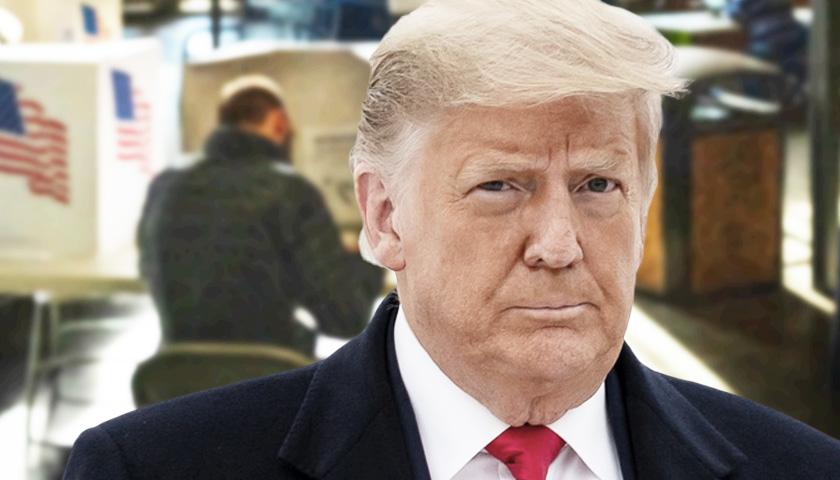by Natalia Mittelstadt
Three more red states — Florida, Missouri, and West Virginia — this week followed Louisiana and Alabama in withdrawing from a multistate data-sharing partnership that facilitates voter registration and maintenance of voter rolls, citing unmet concerns over protecting voter information and partisan influence at the nonprofit.
The latest withdrawals from the Electronic Registration Information Center (ERIC) came after the nonprofit’s board of directors rejected changes proposed by a bipartisan working group of several member states.
The rejected proposals included increasing protections for confidential voter information and limiting the power of partisan ex-officio ERIC board members, according to press releases from the departing states.
ERIC bills itself as a data-rich resource participating states can use in updating voter rolls.
“Each member state receives reports,” explains ERIC’s Frequently Asked Questions page, “that show voters who have moved within their state, voters who have moved out of state, voters who have died, duplicate registrations in the same state, and individuals who are potentially eligible to vote but are not yet registered.
“States may request a report identifying voters who appear to have voted twice within the state in the prior federal election, voted in more than one state in the prior federal election, or who voted on behalf of a deceased voter in the prior federal election.”
The three states’ withdrawals will take effect on June 3, with Alabama set to exit on Apr. 28. Following the departures, membership in the partnership will fall to 28 states and Washington, D.C., according to ERIC’s website.
ERIC’s founder and nonvoting board member is David Becker, who also founded the Center for Election Innovation & Research (CEIR). That organization, which received nearly $70 million from Meta CEO Mark Zuckerberg’s Chan Zuckerberg Initiative in 2020, claims, “The 2020 general election was the most secure in American history.”
A former trial attorney in the Voting Section of the Department of Justice’s Civil Rights Division, Becker has been described by former colleagues as “a hard-core leftist.”
Florida Secretary of State Cord Byrd said in a statement Monday: “As Secretary of State, I have an obligation to protect the personal information of Florida’s citizens, which the ERIC agreement requires us to share. Florida has tried to back reforms to increase protections, but these protections were refused. Therefore, we have lost confidence in ERIC.”
Missouri Secretary of State Jay Ashcroft said on Monday: “Voter confidence is compromised when individuals vote in more than one state and nothing is done. It appears that ERIC will not make the necessary changes to address these concerns, therefore, it is time to move on.”
In a letter to ERIC Executive Director Shane Hamlin, Ashcroft explained that the reasons for Missouri’s exit include: ERIC’s refusal “to require member states to participate in addressing multi-state voter fraud”; focus “on adding names to voter rolls by requiring a solicitation to individuals who already had an opportunity to register to vote and made the conscious decision to not be registered”; unnecessary restriction on “how Missouri utilizes data reports”; and the limited benefits Missouri derives from the partnership with only three of its bordering states as members.
West Virginia Secretary of State Mac Warner said Monday: “There is no defensible justification to allow any opportunity for partisanship in voter registration and list maintenance, much less in the administration of our nation’s elections. It truly is a shame that an organization founded on the principle of nonpartisanship would allow the opportunity for partisanship to stray the organization from the equally important principle of upholding the public’s confidence.”
Warner announced that West Virginia will supplement its “state list-maintenance data sources that ERIC had facilitated” by using the U.S. Postal Service to identify voters who move out of state and the Social Security Administration Master Death File and DMV abandoned voter registrations to identify deceased voters.
Conservative election law nonprofit Public Interest Legal Foundation (PILF) is currently seeking to obtain ERIC voter list maintenance reports via lawsuits in Louisiana, Colorado, the District of Columbia, and Alaska.
“ERIC is currently the only system that allows states to find out who is registered to vote in multiple states,” PILF President J. Christian Adams said in a statement. “States do not have any other available systems to use right now. Information leading to the arrest of double cross state voters is essential for voter list maintenance. ERIC’s wall of secrecy is causing a lack of trust and erosion of confidence. ERIC must become transparent, or it will continue to lose member states.”
Former President Donald Trump urged red states to abandon ERIC in a Truth Social post on Monday.
“All Republican Governors should immediately pull out of ERIC,” he wrote, “the terrible Voter Registration System that ‘pumps the rolls’ for Democrats and does nothing to clean them up. It is a fools game for Republicans….And while these Governors are at it, GO TO SAME DAY VOTING, ALL PAPER BALLOTS, AND VOTER I.D. (VOTER IDENTIFICATION). Mail-In Voting ONLY for FAR AWAY MILITARY and those that are VERY SICK! PROBLEMS ON ELECTION’S [sic] SOLVED!”
ERIC has not responded to a request for comment.
“We are a member-run, member-driven organization,” Hamlin wrote in a March 2 open letter on ERIC’s website. “State election officials — our members — govern ERIC and fund our day-to-day operations through payment of annual dues, which they set for themselves.”
Hamlin stressed the security of voter data maintained by ERIC, while acknowledging it is accessible as needed to ERIC employees, who work remotely to limit the organization’s operating costs.
“ERIC is never connected to any state’s voter registration system,” he wrote. “Members retain complete control over their voter rolls and they use the reports we provide in ways that comply with federal and state laws.”
– – –
Natalia Mittelstadt is a reporter at Just the News. Mittelstadt graduated from Regent University with Bachelor of Arts degrees in Communication Studies and Government.
Photo “Donald Trump” by Trump White House Archived. Background Photo “Election Day” by Phil Roeder. CC BY 2.0.





